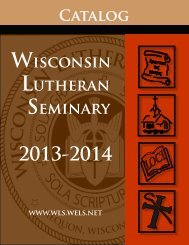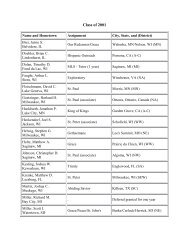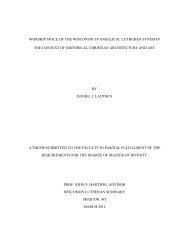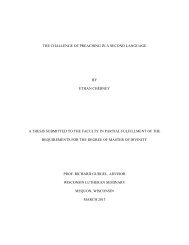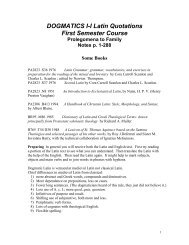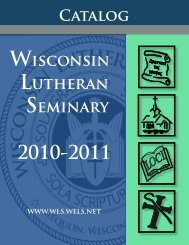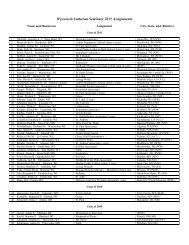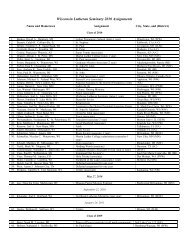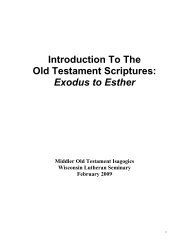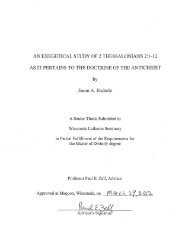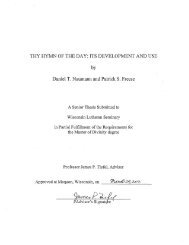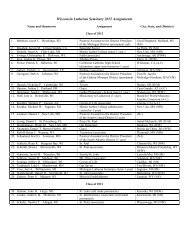Untitled - Wisconsin Lutheran Seminary - WELS
Untitled - Wisconsin Lutheran Seminary - WELS
Untitled - Wisconsin Lutheran Seminary - WELS
Create successful ePaper yourself
Turn your PDF publications into a flip-book with our unique Google optimized e-Paper software.
notes the lack of a governing preposition with τῷ ψεύδει. He says, “This is unusual and may<br />
serve to emphasize the absolute character of the ‘lie’ here and the ‘truth’ in the next verse.” 106<br />
Paul brought up this truth/lie concept in his letter to the Romans where, speaking of the<br />
unbelievers, he says, “They exchanged the truth of God for a lie, and worship and served created<br />
things rather than the Creator” (Ro 1:25). God confirms this delusion that those who are<br />
perishing have chosen for themselves.<br />
They will be condemned<br />
12 ἵνα κριθῶσιν πάντες οἱ μὴ πιστεύσαντες τῇ ἀληθείᾳ ἀλλὰ εὐδοκήσαντες τῇ ἀδικίᾳ.<br />
12) so that all those who did not believe in the truth but who took pleasure in wickedness will<br />
be condemned.<br />
Paul pens the final result of God’s judgment on the delusions the “lawless one” brings.<br />
The ἵνα expresses a purpose clause. The verb κριθῶσιν in the aorist passive subjunctive form<br />
implies the ultimate outcome of God’s judgment on them, condemnation. The verb is pulled<br />
forward for emphasis. Paul here is speaking of the Final Judgment. The same judgment that<br />
awaits the man of lawlessness awaits those who believe in him and reject the gospel truth. The<br />
reason for their condemnation is twofold. They “did not believe in the truth” (οἱ μὴ πιστεύσαντες<br />
τῇ ἀληθείᾳ), that is the gospel of Jesus. And along with this rejection of the gospel they “took<br />
pleasure in wickedness” (εὐδοκήσαντες τῇ ἀδικίᾳ). Martin comments on the verb εὐδοκήσαντες:<br />
The verb…implies the exercise of personal judgment and will. But delighting in<br />
wickedness in this context implies far more than finding a particular sinful act enjoyable.<br />
It represents one’s basic attitude toward God. Faced with the opportunity to follow<br />
God’s truth, those who delight in wickedness are those who have chosen to reject God<br />
and follow the path of “wickedness.” 107<br />
The Greek word ἀδικίᾳ (“wickedness”) is the same word that Paul used in verse ten to<br />
describe the deception of the lawless one. This word stands in contrast to the truth (ἀληθείας)<br />
Paul speaks of in the second half of verse ten. Paul thus describes the fate of those who follow<br />
106 Charles A. Wanamaker, The Epistles to the Thessalonians: A Commentary on the Greek Text (Grand<br />
Rapids, MI: Wm. B. Eerdmans Publishing Co., 1990), 262.<br />
107 D. Michael Martin, 1, 2 Thessalonians. Vol. 33, The New American Commentary (Broadman & Holman<br />
Publishers, 1995), 250.<br />
49



